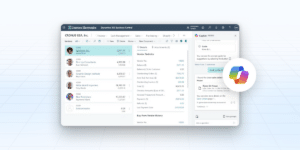Microsoft has launched wave 1 of the 2024 update for Microsoft Dynamics 365 Business Central, which will be available from April to September 2024. This release brings a range of enhancements and new features. Designed to optimise the user experience, strengthen integration with Microsoft tools, improve automation and efficiency in business processes.
Another key area of investment for Microsoft includes enhancing application features for project and service management, along with improving the consolidation experience in the finance sector. To explore how these updates can benefit your business, continue reading to discover our standout application features from the release.
Field Service Integration with Business Central
As part of the wave 1 release, Microsoft has introduced an exciting integration between Field Service and Business Central. The integration aims at improving how organisations manage their service operations. This will be particularly valuable for industries that depend on effectively managing both field operations and financial processes.
Benefits and key features of the Field Service Integration
One of the standout features of the integration is the introduction of new table mappings, allowing data to flow smoothly between Field Service and Business Central. For example, work order products and services in Field Service are automatically linked to project journal lines in Business Central. This reduces manual entry and ensures that every step of the service process is streamlined.

Additionally, users can manage the consumption of products and services from Field Service work orders directly within Business Central. This means that as service tasks are completed in the field, the data automatically flows into Business Central. From here it now has the capability to be transformed into billable quantities. Businesses also have the flexibility to choose when work order details are synchronised, providing greater control over service data management.
Businesses in industries such as, utilities, maintenance services, equipment rental, healthcare, and telecommunications will see the most benefit from this update. These industries often need to coordinate complex fieldwork, track inventory usage, and manage service billing. This makes a seamless connection between field service operations and financial management essential.
Overall, the Field Service integration will help many industries reduce administrative work while improving their ability to track service operations and financial transactions. Additionally, this integration will contribute to more efficient service delivery and better control over operational costs. To find out how to set up the Field Service integration with Business Central, please refer here.
Manage Subscription Billing, Revenue and Expense Recognition
With many businesses increasing their focus on recurring revenue models, effectively managing subscription billing and revenue recognition is now a priority. The 2024 release introduces a new subscription module in Business Central that simplifies the entire process of handling subscription contracts. This allows companies to spend less time on organisation and invoicing, enabling them to focus more on their products and services.
Benefits and key features of the subscription module
The new module allows businesses to support various subscription scenarios, from hardware maintenance to IT support and cleaning services. The process is simplified, allowing for the management of portfolios containing items and services billed on a recurring schedule. This flexibility means companies can combine services and products within mixed subscription contracts, enabling efficient billing practices.
This module includes standardised templates that simplify the setup of parameters and schedules for recurring billing. These templates not only simplify the management of current pricing but also make it easier to plan for future updates. From an accounting perspective, the module automates the posting of accruals to balance sheet accounts. In addition, the system ensures that revenue and expenses are properly allocated to the correct periods on the income statement.

Key features of the subscription module include:
- Contracts for recurring billing of items and services
- Flexible billing schedules
- Usage-based billing
- Automated processes
- Ferral Integration
- Revenue recognition based on billing schedules
- Contract updates (parameters and prices)
Additionally, standard reports for contracts, customers, billing schedules, recognised revenue, and future billing dates are now available, many of which can be viewed as Power BI visuals. The subscription billing functionality is included within the Essential License, providing great value for companies aiming to maximise operational efficiency and drive growth through recurring revenue models.
Connect Business Central with Shopify B2B
Another new beneficial feature from the wave 1 release is the ability to Connect Business Central with Shopify B2B. This integration provides businesses with greater visibility into areas such as pricing, customer details, order histories, billing, and payments. Connecting Shopify B2B with Business Central also allows businesses to manage their operations more efficiently, respond faster to custom inquiries, and handle returns/refunds with improved accuracy.
Benefits and key features of connecting Business Central with Shopify B2B
One noteworthy feature in the Shopify Connector is the support for multitier pricing structures, multiple currencies, and varied discount groups. This is especially beneficial for businesses managing multiple buyers and groups, as it allows you to adapt to different pricing strategies across regions.
Another stand out feature is the data synchronisation between Shopify and Business Central. Allowing businesses to automate workflows to save time and reduce errors. This ensures that product details, pricing, and customer information are always up to date in real time. The improved data synchronisation, also allows businesses to easily manage multiple Shopify stores and international operations, by providing consistent and accurate information across both platforms.
Additionally, the integration simplifies administrative tasks by automating processes time-consuming, such as catalogue management, financial tracking, and tax compliance. This not only improves operational efficiency but also allows businesses to expand their online presence with confidence, knowing that Business Central can support their financial reporting and regulatory needs.

The Shopify Connector offers specialised tools for B2B management, enabling businesses to add and synchronise companies directly with Shopify, create customer profiles, and assign catalogues. Additionally, users have the option to set customised price synchronisation for individual catalogues. This feature is beneficial as it helps businesses maintain control over their pricing strategies while reducing manual interventions.
Want to learn more about the wave 1 release?
These are just a few highlights of the latest update to Dynamics 365 Business Central. Want to know more? Check out the full release plan on the Microsoft Learn website for a full overview of the 2024 release wave 1 features and release dates.



